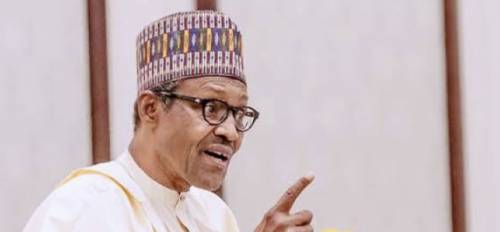Hot Stories
Recent Stories
FG Blasts Oyo Government For Planning To Reopen Schools
Posted by Thandiubani on Tue 23rd Jun, 2020 - tori.ngThe government of Oyo state has been called to shelve its plan of reopening schools as it might put students at risk of contracting the deadly virus.

President Muhammadu Buhari
The federal government has criticized plans by Oyo state government to reopen schools from June 29, calling it insensitive.
The Minister of State for Education, Chukwuemeka Nwajiuba made the remark on Monday.
He warned that such decision if taken could raise COVID-19 infection figures in the state.
As of 10pm on Monday, Oyo ranked fourth on the table with 621 active cases from the 912 infections figures, confirmed in the state by the Nigeria Centre for Disease Control (NCDC).
The minister expressed concern over the Oyo government’s plan during the briefing by the Presidential Task Force on COVID -19 Control in Abuja.
Oyo state Governor Seyi Makinde had reeled out plans to reopen schools, worship centres and others against Federal Govenrment’s directive on closure of schools.
Nwajiuba, who said the Federal Ministry of Education did not give out any guideline to the state government to reopen schools, noted that governors have as their primary responsibility to secure the lives of their citizens, in the face of a pandemic.
He added that like all other sub-nationals, governors were under the Constitution of the Federal Government of Nigeria.
Stressing why government cannot reopen schools at this time, the minister noted that reopening of schools could lead to the exposure of teachers, pupils, drivers, cooks, vendors, their family members and friends to the dreaded virus.
The minister said: “Out of the 774 local government areas in Nigeria, there are actually few local governments with a lot of this burden and therefore it is easy to get the perception around the edges of the country that some things are not happening because they are not happening within our immediate locality.
“But we must appreciate that the primary purpose of governors is the security of his citizens. Public health is key and primary and in that primary security delivery, they (governors), are always extremely cautious in making any pronouncements around this because the education sector holds the largest number of infrastructure in the country; a good 138,000 primary schools around the country.
“There are clearly 600 all kinds of institutions awarding certificates all around Nigeria there are just lots of it. And at any given time in Nigeria, there are two million people attaining one form of education or the other.
“For you to even begin to decide to unleash this in the public in the face of a pandemic is to be a very bit insensitive.
“The least we can do at the moment is to keep our children, our most priced assets, the future of Nigeria under lock and key first. When we are sure that it’s safe to release them, gladly we will.”
Nwajiuba also said the ministry was in discussion with examination bodies on how final year students could sit for their exams.
He said similar meeting was held in the Gambia on Monday to decide the fate of students waiting to write the West African Examination Council (WAEC).
The minister also said the students would be expected to reconvene for a revision session ahead of the final decisions on WAEC.
He said: “We have finished meeting with WAEC; they are communicating in Gambia at the moment. When we get feedback from them we are struggling to see how we can bring the exit year children briefly to come to a revision session ahead if whatever these assembles have agreed.
“Parents should be rest assured that we will do this with utmost care and only in places where we can be able to institutionalise and be able to use the facilities to be able to help these children.”
On the outcry by parents on payment of school fees in private schools, the minister appealed to school proprietors to desist from doing so.
He urged them to approach the Central Bank of Nigeria (CBN) for salary support.
Top Stories
Popular Stories
Stories from this Category
Recent Stories






















































